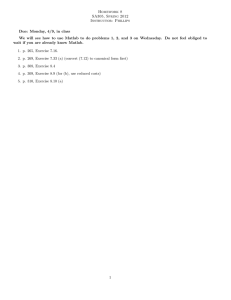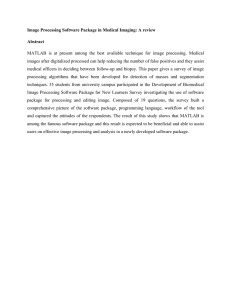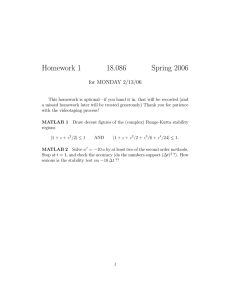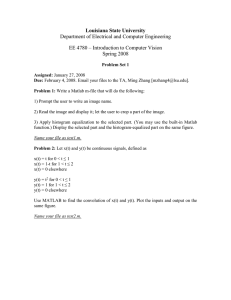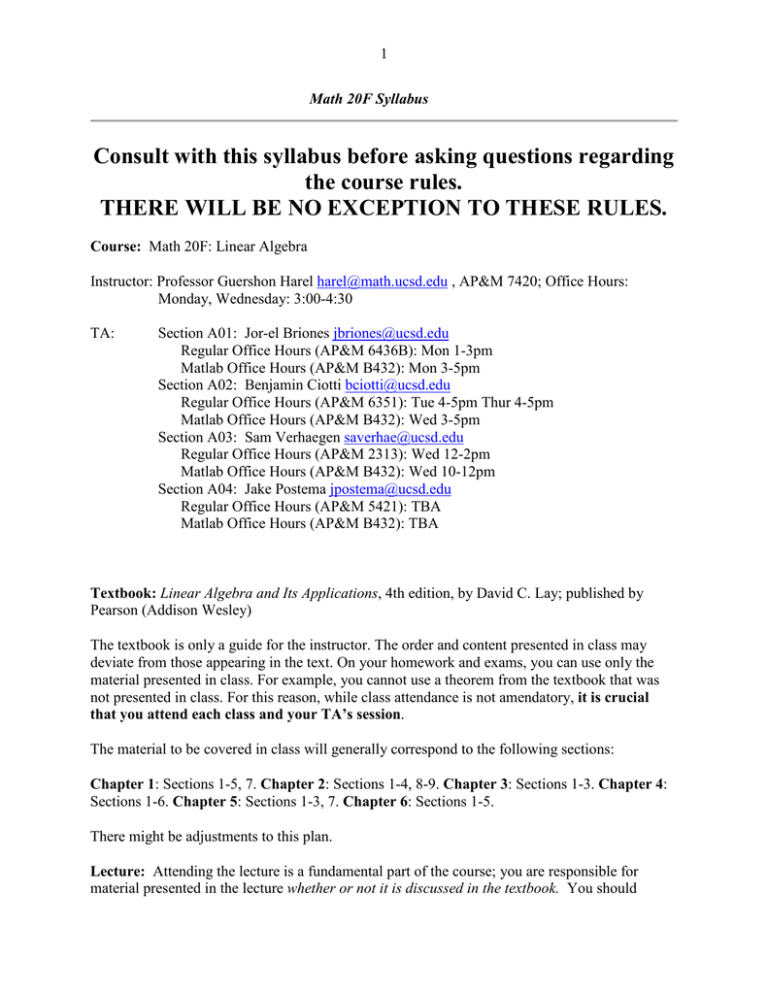
1
Math 20F Syllabus
Consult with this syllabus before asking questions regarding
the course rules.
THERE WILL BE NO EXCEPTION TO THESE RULES.
Course: Math 20F: Linear Algebra
Instructor: Professor Guershon Harel harel@math.ucsd.edu , AP&M 7420; Office Hours:
Monday, Wednesday: 3:00-4:30
TA:
Section A01: Jor-el Briones jbriones@ucsd.edu
Regular Office Hours (AP&M 6436B): Mon 1-3pm
Matlab Office Hours (AP&M B432): Mon 3-5pm
Section A02: Benjamin Ciotti bciotti@ucsd.edu
Regular Office Hours (AP&M 6351): Tue 4-5pm Thur 4-5pm
Matlab Office Hours (AP&M B432): Wed 3-5pm
Section A03: Sam Verhaegen saverhae@ucsd.edu
Regular Office Hours (AP&M 2313): Wed 12-2pm
Matlab Office Hours (AP&M B432): Wed 10-12pm
Section A04: Jake Postema jpostema@ucsd.edu
Regular Office Hours (AP&M 5421): TBA
Matlab Office Hours (AP&M B432): TBA
Textbook: Linear Algebra and Its Applications, 4th edition, by David C. Lay; published by
Pearson (Addison Wesley)
The textbook is only a guide for the instructor. The order and content presented in class may
deviate from those appearing in the text. On your homework and exams, you can use only the
material presented in class. For example, you cannot use a theorem from the textbook that was
not presented in class. For this reason, while class attendance is not amendatory, it is crucial
that you attend each class and your TA’s session.
The material to be covered in class will generally correspond to the following sections:
Chapter 1: Sections 1-5, 7. Chapter 2: Sections 1-4, 8-9. Chapter 3: Sections 1-3. Chapter 4:
Sections 1-6. Chapter 5: Sections 1-3, 7. Chapter 6: Sections 1-5.
There might be adjustments to this plan.
Lecture: Attending the lecture is a fundamental part of the course; you are responsible for
material presented in the lecture whether or not it is discussed in the textbook. You should
2
expect questions on the exams that will test your understanding of concepts discussed in the
lecture.
Proofs will appear throughout the lecture. Most of the homework and exam problems will be
proof based. At least 60% of the problems on the exams will be similar to homework problems.
Homework: Summer courses are 5 weeks long, whereas corresponding Quarter courses are 10
weeks long. Therefore, the amount of homework you should expect in this course is double the
amount assigned in the corresponding quarter course.
Homework assignment will appear on TED, and will be due at 5:00pm on the indicated due
date. Please turn in your homework assignments in the homework dropbox in the basement of
AP&M. Late homework will not be accepted under any circumstance.
Homework will be returned in discussion section.
• The grader is under no obligation to grade messy or disorganized homework. (This includes
homework that has not been stapled together.)
• The upper right corner of each assignment must include: o Your name o Your discussion
section (A01, A02, etc.). If you attend a different section from the one in which you are enrolled,
specify which is which on your assignment. o Homework assignment number
It is allowed and even encouraged to discuss homework problems with your classmates, but your
final write up of your homework solutions must be your own work.
You are strongly encouraged to attend the instructor’s and TAs’ office hours to discuss
homework or material covered in class.
Questions regarding administrative aspects of homework should be
directed to the TAs, not to the instructor.
MATLAB: In applications of linear algebra, the theoretical concepts that you will learn in
lecture are used together with computers to solve large scale problems. Thus, in addition to your
written homework, you will be required to do homework using the computer language
MATLAB. The Math 20F MATLAB Assignments page contains all information relevant to the
MATLAB component of Math 20F. The first assignment is due in week 2 of the course. You
can do the homework on any campus computer that has MATLAB.
Questions regarding the MATLAB assignments should be directed
to the TAs, not to the instructor.
There are also tutors available beginning Thursday or Friday of the first week of classes in B432
of AP&M. Please turn in your homework assignments in the dropbox in the basement of AP&M
by 3:00pm on the indicated due date (as indicated on the MATLAB Assignment Due Dates
3
page); note that late MATLAB homework will not be accepted, but in case you have to miss
one MATLAB assignment, your lowest MATLAB homework score will be dropped.. There
will be a MATLAB quiz at the end of the quarter.
Exams: One midterm exam and a final exam will be given during the summer quarter. No
notes, cheatsheets, books, or any material, including calculators and cellphones will be allowed
during these exams. There will be no makeup exams.
It is your responsibility to ensure that you do not have a schedule conflict involving the final
examination; you should not enroll in this class if you cannot take the final examination at its
scheduled time.
Midterm: Wednesday, July 15th, in class, during class hours.
Final: Friday, July 31st, location TBA, 7-10pm
Regrade Policy: Homework and midterm exams will be returned in the discussion sections. If
you believe there might be an error in the grading and wish to have your exam regraded, you
must observe the following rules:
1. Return your exam immediately to your TA. Regrade requests will not be considered once
the quiz or exam leaves the room.
o If you disagree with the TA's answer to your regrade request, you may ask for the
instructor to review it. In order to do this, you must:
1. Return your exam immediately to your TA and,
2. Ask that they forward your exam to the instructor.
Instructor review requests will not be considered once the exam leaves the room.
2. Retrieve your exam during discussion section or arrange to pick it up from your TA
within one week after it was made available for pickup (i.e., returned) in section. In order
to be considered, regrade requests must be submitted within one week after being
returned in section.
Grading: Your course grade will be determined by your cumulative average at the end of the
term and will be based on the following scale:
A+ A A- B+ B B- C+ C C97 93 90 87 83 80 77 73 70
The instructor may adjust the above scale based on their class's performance.
Your cumulative average will be calculated as follows:
20% Homework, 20% Midterm, 10% MATLAB, 50% Final Exam
If you missed the midterm and you have one of the documents listed below, then your
cumulative average will be calculated as follows:
4
20% Homework, 10% MATLAB, 70% Final Exam
Note: The MATLAB 10% is a combination of 5% MATLAB Assignments and 5% MATLAB
quiz.
The document needed is one the following:
1. A doctor’s note indicating explicitly that you physically were unable to attend the exam.
2. A letter from your Dean of Students explaining that personal circumstances, other than
illness, prevented you from taking the exam.
Without one of these documents, your grade on the missed midterm will be zero; in which case,
your cumulative average will be:
20% Homework, 10% MATLAB, 70% Final Exam.
You must pass the final exam to pass the course.
Academic Integrity: UCSD's code of academic integrity outlines the expected academic
honesty of all students and faculty, and details the consequences for academic dishonesty. The
main issues are cheating and plagiarism, of course, for which we have a zero-tolerance policy.
(Penalties for these offenses usually include assignment of a failing grade in the course, and can
be much more significant.) However, academic integrity also includes things like giving credit
where credit is due (listing your collaborators on homework assignments, noting books or papers
containing information you used in solutions, etc.), and treating your peers respectfully in class.
In addition, here are a few of our expectations for etiquette in and out of class.
•
•
•
•
Entering/exiting class: Please arrive on time and stay for the entire class/section period.
If, despite your best efforts, you arrive late, please enter quietly through one of the rear
doors and take a seat near where you entered. Similarly, in the rare event that you must
leave early (e.g. for a medical appointment), please sit close to a rear exit and leave as
unobtrusively as possible.
Noise and common courtesy: When class/section begins, please stop your
conversations. Wait until class/section is over before putting your materials away in your
backpack, standing up, or talking to friends. Do not disturb others by engaging in
disruptive behavior. Disruption interferes with the learning environment and impairs the
ability of others to focus, participate, and engage.
Electronic devices: Please do not use devices (such as cell-phones, laptops, tablets,
iPods) for non-class-related matters while in class/section. No visual or audio recording is
allowed in class/section without prior permission of the instructor (whether by camera,
cell phone, or other means).
E-mail etiquette: You are expected to write as you would in any professional
correspondence. E-mail communication should be courteous and respectful in manner
and tone. Please do not send e-mails that are curt or demanding.

